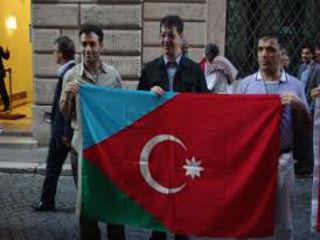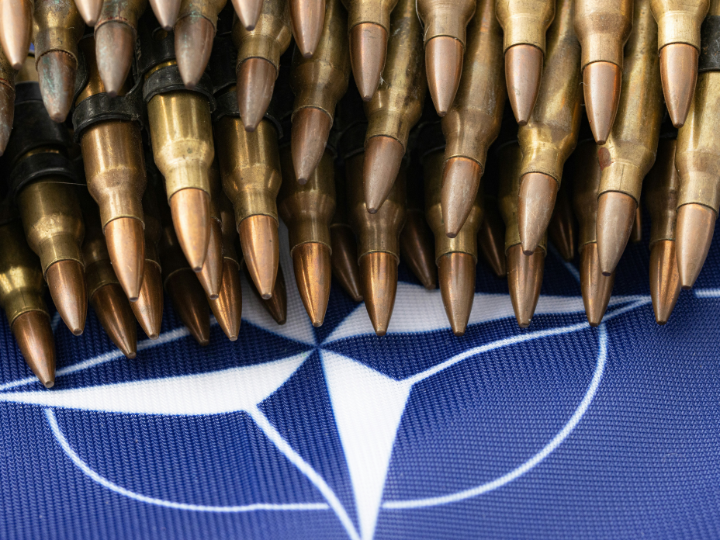Azerbaijanis go to the ballot box in less than two weeks, with almost 80 per cent of voters believing their nation is "heading in the right direction" under the present leadership and that the unresolved Nagorno-Karabakh conflict remains the defining issue.

Of the most important issues facing voters, just 7.2 per cent in this resource-rich nation said the economy, but 41.3 per-cent chose Nagorno-Karabakh, which - along with seven surrounding territories - continues to be occupied by Armenia in defiance of international resolutions calling for an immediate withdrawal.
by
Martin Banks
One of the findings of two pre-election surveys on the eve of the much-awaited parliamentary elections in the country on November 1st is that the Nagorno-Karabakh conflict is main problem for Azerbaijan people
Azerbaijanis go to the ballot box in less than two weeks, with almost 80 per cent of voters believing their nation is "heading in the right direction" under the present leadership and that the unresolved Nagorno-Karabakh conflict remains the defining issue.
In the eyes of the Azerbaijanis Nagorno-Karabakh has been occupied by Armenia since the war ended in 1994. A shaky ceasefire has been in place since then, but it is regularly broken by shelling - leaving hundreds of thousands of war refugees still displaced.
Image removed by sender.
A pre-election poll by respected American polling firm Arthur J. Finkelstein & Associates focuses on a wide range of issues affecting the nation's 5.1 million voters.
Asked "are things moving in the right direction or the wrong direction?" 77.1 per cent said right direction while only 14.7 per cent said the wrong direction.
Of the most important issues facing voters, just 7.2 per cent in this resource-rich nation said the economy, but 41.3 per-cent chose Nagorno-Karabakh, which - along with seven surrounding territories - continues to be occupied by Armenia in defiance of international resolutions calling for an immediate withdrawal.
George Birnbaum, Executive Director of Arthur J. Finkelstein & Associates, said, "Five times more respondents named Nagorno-Karabakh as the most important issue facing the nation than the economy. It remains a highly emotive issue that pervades all aspects of politics and government in ways many observers in the West simply don't understand."
In terms of geo-political issues, 81.7 per cent of respondents agreed that "Azerbaijan is an island of stability in a region where most countries are unstable" and importantly, given what is unfolding across Europe, 71 per cent believe the present government is well-placed to prevent the immigration crisis from spilling into Azerbaijan.
More than 80 per cent also believe the country's leadership, which shares intelligence with western nations on security issues, has protected the nation against acts of terror.
As of today, New Azerbaijan Party candidates are favoured by 74.4 percent of decided voters, with fourteen percent remaining undecided. This means that in the vast majority of constituencies, the New Azerbaijan Party candidates are expected do very well.
The upcoming election will also serve as a referendum on the performance of President Ilham Aliyev, who was re-elected in late 2013. Asked "in general, how would you rate the job done by the current President Ilham Aliyev?" 82.1 per cent said either good or excellent.
"It is easy to conclude from our poll that voters want more of the same," said Birnbaum, whose company correctly forecast the result of the 2013 election.
"They want political and economic stability; they want to be kept safe from terror; and they want their elected representatives to keep fighting for the return of Nagorno-Karabakh."
The poll, of 1,000 registered voters, was conducted face to face in 108 constituencies around Azerbaijan between September 28 and October 9.
Its findings are echoed by "Opinionway", a French research company, which conducted a similar survey with 1,200 registered voters.
Some 58% of respondents noted that things in Azerbaijan were going on in the right direction with 22.9% saying that things were going in the wrong direction.
As for the question on "What are the most important problems in Azerbaijan?", 66.5 per cent of the respondents said Nagorno-Karabakh.
The poll findings come in the wake of a controversial resolution adopted by the European Parliament that threatens to seriously undermine relations between the EU and the oil-rich state.
The non-binding resolution was adopted on September 10th, but faced fierce opposition, especially from the largest political group in the European Parliament, the centre-right European People's Party. It calls on the European Commission "to review and suspend temporarily, if needed, all funding not related to human rights, civil society and grassroots level people-to-people cooperation granted to Azerbaijan through the European Neighbourhood Instrument" and recalls Parliament's decision to send a delegation to Azerbaijan.
It resulted in the National Assembly of Azerbaijan ending Azerbaijan's participation in the Euronest Parliamentary Assembly, the inter-parliamentary forum established in the framework of the Eastern partnership.
The motion has incensed both the authorities in Azerbaijan and numerous MEPs, including Cristian Dan Preda, EPP group coordinator for foreign affairs, who said his group refused to endorse it because "we consider the text to be just a proof of radicalism that had no potential of bringing any positive effects."
On the thorny issue of Nagorno-Karabakh, leading British MEP Sajjad Karim says, "Azerbaijan is frustrated with the lack of progress over Nagorno-Karabakh. It feels that, far too often, the international community disregards the challenges it has had to face in the aftermath of this war in terms of refugees and internally displaced persons. It is true that the international community has probably not been as active as it could have been in solving this protracted conflict which is still, as we speak, claiming lives."
Internationally, the mountainous territory of Nagorno-Karabakh is still considered part of Azerbaijan.
In the latest outbreak of hostilities last month, casualties were reported in renewed shelling between Armenian and Azerbaijani troops.
In September, the foreign ministers of both countries - Azerbaijan's Elmar Mammadyarov and Armenia's Edvard Nalbandian - met in New York, in the presence of mediators from the Organisation for Security and Co-operation in Europe (OSCE).




 By: N. Peter Kramer
By: N. Peter Kramer
